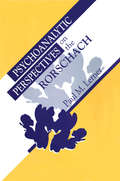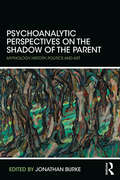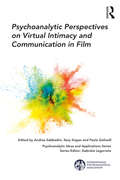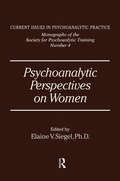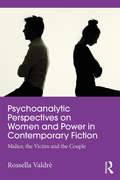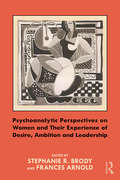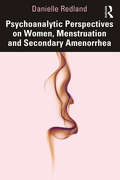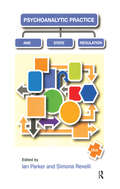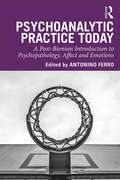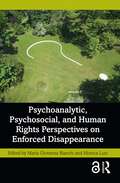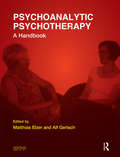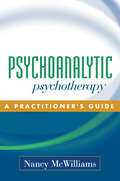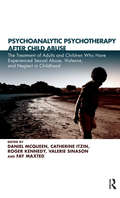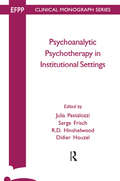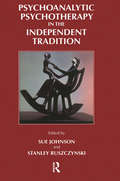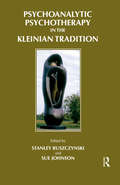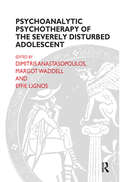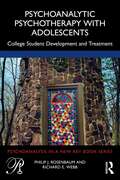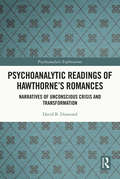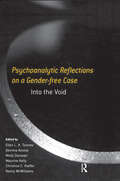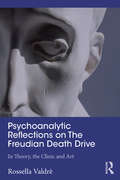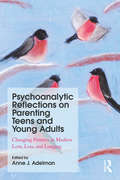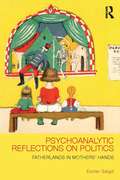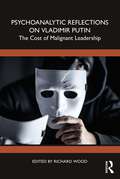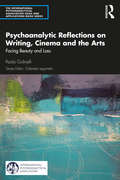- Table View
- List View
Psychoanalytic Perspectives on the Rorschach
by Paul M. LernerFew books illuminate a domain of clinical inquiry as superbly as Psychoanalytic Perspectives on the Rorschach. Paul Lerner has written a comprehensive text that offers a richly detailed, multidimensional vision of the Rorschach as the ideal medium for operationalizing, testing, and in some instances transforming contemporary clinical theory. For psychoanalytic therapists, the book provides a fascinating overview of how the coevolution of psychoanalytic theory and Rorschach technique has created new possibilities for conceptual integration. Lerner explores recent advances in our ability to operationalize such clinical concepts as splitting, dissociation, and false-self organization. He then reviews how these advances have been applied to research into psychic organization across different diagnostic categories, including anorexia and bulimia, aggressive and psychopathic personality, and schizotypal disorders. Finally, Lerner shows how the resulting data offer a unique vantage point from which to clarify such critical topics as developmental object relations and the structure of primitive experience. Rorschach scholars will appreciate Lerner's informed discussions of theorists as diverse as Rapaport and Schachtel, Exner and Mayman, Schafer and Leichtman. Rorschach students, for their part, will find the book an unusually lucid introduction to test administration, scoring, interpretation, and report writing. Even here, however, Lerner's breadth and originality are apparent, for his exposition of these testing fundamentals incorporates fresh discussions of the nature of the Rorschach test, the impact of the patient-examiner relationship, and the value of the test in treatment planning. Timely, definitive, and uniquely integrative, Psychoanalytic Perspectives on the Rorschach will be valued by students, clinicians, and researchers well into the next century.
Psychoanalytic Perspectives on the Shadow of the Parent: Mythology, History, Politics and Art
by Jonathan BurkePsychoanalytic Perspectives on the Shadow of the Parent explores the psychological challenges faced by the offspring of either famous or notorious parents. Beginning with parental legacies found in mythology and the Bible, the book presents a series of case studies drawn from a range of narrative contexts, selecting personalities drawn from history, politics, psychoanalysis and literature, all viewed from an analytic perspective. The concluding section focuses on the manifestation of this parental shadow within the field of fine art, as written by artists themselves. This is a lively and varied collection from a fascinating range of contributors. It provides readers with a new understanding of family history, trauma and reckoning screened through a psychoanalytic perspective, and will appeal to psychoanalysts, psychotherapists, counsellors and anyone interested in the dynamics of the family.
Psychoanalytic Perspectives on Virtual Intimacy and Communication in Film (The International Psychoanalytical Association Psychoanalytic Ideas and Applications Series)
by Andrea Sabbadini Ilany Kogan Paola GolinelliPsychoanalytic Perspectives on Virtual Intimacy and Communication in Film brings together a group of psychoanalysts to explore, through film, the new forms of communication, mainly the internet, that enter more and more frequently into the affective lives of people, their intimacy and even the analytic room. The contributors, all practising psychoanalysts, analyse the potential and surprising transformations that human relationships, including psychoanalysis, are undergoing. At present, it is difficult to value the future importance and predict the possible disquieting consequences of the use and abuse of the new technologies; we run the risk of finding ourselves unprepared to face this revolutionary transformation in human connections and affects. Will it be possible in a near future that human beings prefer to fall in love with a machine gifted with a persuasive voice instead of a psychoanalyst 'in person'? The contributors explore the idea that virtual intimacy could begin to replace real life, in sentimental and psychoanalytic relationships. Imagination and fantasy may be strengthened and may ultimately prevail over the body, excluding it entirely. Can the voice of the analyst, sometimes transmitted only by telephone or computer, produce a good enough analytic process as if it were in-person, or will it help to foster a process of idealisation and progressive alienation from real life and connections with other human beings? The film Her (2013), alongside others, offers a wonderful script for discussing this matter, because of the deep and thoughtful examination of love and relationships in the contemporary world that it provides. Psychoanalytic Perspectives on Virtual Intimacy and Communication in Film will be of great interest to all psychoanalysts and psychoanalytic psychotherapists interested in the ongoing impact of technology on human relationships.
Psychoanalytic Perspectives On Women
by Elanie V. SiegelFirst published in 1992. Routledge is an imprint of Taylor & Francis, an informa company.
Psychoanalytic Perspectives on Women and Power in Contemporary Fiction: Malice, the Victim and the Couple
by Rossella ValdrèPsychoanalytic Perspectives on Women and Power in Contemporary Fiction psychoanalytically examines contemporary fiction portraying the female in a reversal of the stereotyped victim role. The recent popularity of powerful female characters suggests that literature is ahead in its understanding the desires, fantasies and unconscious emotions of the public. This book explores a form of intimacy frequently observed in consulting rooms and in life in general: malicious intimacy. Specific to the conjugal bond, it is a type of intimacy connected to the relationship between the two halves of the couple that is extremely powerful and painful. Instead of clinical cases, Rossella Valdré examines four contemporary and widely successful novels, published contemporaneously, which capture perfectly this type of psychopathological universe. Valdré then maps out psychoanalytic hypotheses regarding the persistency of these malicious intimacies. Through analysis of these examples, Valdrè investigates the roots and hypotheses of a new scenario on victim-executioner roles played out in the intimacy of the couple. Exploring how and if the contemporary couple is undergoing profound changes, she provides an overview of the various deep-seated psychological mechanisms and unconscious dynamics that may be at work. The book explores the need to not be dependant upon a love object as an extreme defence against abandonment or self-collapse. Valdrè argues that such a configuration is very common, and that Idealization in contemporary life is one of the reasons behind the most of sufferance in modern couples, something which psychoanalysis can examine through art. Women, perhaps, after emancipation, are living overturned roles and paying a higher cost as a result. Psychoanalytic Perspectives on Women and Power in Contemporary Fiction will appeal to psychoanalysts and psychoanalytic psychotherapists, and be of interest to scholars and students of literature, gender studies, philosophy and sociology.
Psychoanalytic Perspectives on Women and Their Experience of Desire, Ambition and Leadership
by Stephanie Brody Frances ArnoldPsychoanalytic Perspectives on Women and Their Experience of Desire, Ambition and Leadership considers how these factors can be understood, nurtured, or thwarted and the subsequent impact on women’s identity, authority and satisfaction. Psychoanalysis has long struggled with its ideas about women, about who they are, how to work with them, and how to respect and encourage what women want. This book argues that psychoanalytic theory and practice must evolve to maintain its relevance in a volatile landscape. Each section of the book begins with a chapter that reviews contemporary ideas regarding women, as well as psychoanalytic history, gender bias, and societal norms and deficits. Three composite clinical stories allow our distinguished contributors to discuss the contexts within which individual experience can be affected, and the role that clinical work may have to mobilize and advance passion and vitality. In their discussions, the interplay of clinical psychoanalysis, sociopolitical context, and understanding of gender, combine to offer a unique perspective, built on decades of scholarship, personal experience, and clinical expertise. Psychoanalytic Perspectives on Women and Their Experience of Desire, Ambition and Leadership will serve as a reference for all psychoanalysts and psychoanalytic psychotherapists as well as gender studies scholars interested in the progress of psychoanalytic theory regarding women in the 21st century. Contributors to this book include: Rosemary Balsam, Brenda Bauer, Andrea Celenza, Diane Elise, Adrienne Harris, Dorothy Holmes, Nancy Kulish, Vivian Pendar, Dionne Powell, and Arlene Richards.
Psychoanalytic Perspectives on Women, Menstruation and Secondary Amenorrhea
by Danielle Redland"I can be a mother, a wife, a daughter, a sister and a woman without having periods." This book explores two of the oldest and most important symbols of all time: menstruation and secondary amenorrhea. Women of menstruating age commonly experience secondary amenorrhea – a cessation of periods – but most people have never heard of the term, nor do they realise what it represents. Danielle Redland’s curiosity as to why this is posits that menstrual conditions need to be decoded, not just simply treated. Surveying menstruation and Secondary Amenorrhea (SA) principally from a psychoanalytic perspective, with sociocultural, historical, political and religious angles also examined, Psychoanalytic Perspectives on Women, Menstruation and Secondary Amenorrhea draws secondary amenorrhea out of the shadows of its menstruating counterpart, and explores how narratives of womanhood and statehood dominate. Chapters on blood ideology and war amenorrhea, on Freud’s treatment of Emma Eckstein and on the psycho-mythology of Pygmalion, present the reader with visions beyond patriarchy towards more thoughtful ideas on the feminine, challenging assumptions about gender, identity and what is deemed "good" for women. Rich in clinical examples, the book locates menses and their cessation at the heart of personal experience and examines psychosomatic phenomena, the link between psyche and body and the value of interpretation. From the author’s own analysis to a variety of cases linked to hysteria, anorexia, stress, trauma, abuse, helplessness and hopelessness, individual stories and narratives are sensitively recovered and carefully revealed. This refreshing example of multi-layered research and psychoanalytic enquiry by a new, female writer will be of great interest to psychologists, psychotherapists, healthcare and social work professionals and readers of gender studies, history, politics and literature.
Psychoanalytic Practice and State Regulation
by Ian Parker Simona RevelliThis book arises out of an important international conference held in 2006 to discuss how regulation by the state has affected psychoanalysis as a clinical discipline in many different parts of the world. It explores the threat in psychoanalytic practice and draws together arguments against it.
Psychoanalytic Practice Today: A Post-Bionian Introduction to Psychopathology, Affect and Emotions
by Antonino FerroPsychoanalytic Practice Today offers the reader a good understanding of the school of thought inspired by the late work of Wilfred R. Bion. The contributors share a belief in the curative power of the analytic encounter and in the capacity of the human mind to develop from the encounter with a mind capable of reverie, dreaming and thinking. The multitude of vignettes presented emphasise the necessity of the emotional involvement of the analyst with his or her patients for improvement to take place. The book is divided in two parts: ‘Psychopathology’ and ‘Emotions and Feelings’. The first part adapts a more classic description of psychiatric disorders by diagnostic criteria, from neuroses to psychoses and including depression and borderline states. The second part of the book takes a closer look at specific clinical manifestations of basic emotions such as anger, surprise, sadness and more complex ones such as jealousy, abandonment and betrayal. The common thread is represented by the central place of dreaming in the psychoanalytic field as a tool to understand these clinical manifestations, and to allow for their psychic representation as an emotional experience. The contributions together offer a varied introduction to current ideas that are growing increasingly interesting to English speaking readers, with a sufficient character of originality, irreverence and creativity that bears witness to the maturity of Italian psychoanalysis. Psychoanalytic Practice Today will offer new ideas to the practicing psychoanalyst and psychodynamic psychotherapist.
Psychoanalytic, Psychosocial, and Human Rights Perspectives on Enforced Disappearance
by Maria Giovanna BianchiCollecting authoritative contributions, Psychoanalytic, Psychosocial, and Human Rights Perspectives on Enforced Disappearance combines the life experience of victims with the expertise of scholars and practitioners of human rights, psychoanalysis, and artists to compose a picture that renders the complexity of this crime in its legal, psychological, and social aspects. Victims offer a glimpse into the bottomless despair of those who lose a family member in such a dramatic and torturous way. Academic scholars give a picture of this crime in contemporary world. Experts in human rights law address the progress and limitations of the different standards applied in international human rights law. The psychosocial framework in the context of forensic investigations and reparations encourages the decision-making process of the victims and the elaboration of their personal and collective stories. Psychoanalytic authors address the problems of perpetrators' states of mind, the profound psychological and unconscious significance of torture and the disappearance of people by the State, and the issues of memory and trauma in its multiple meanings, individual, collective, and transgenerational. Art is part of this collective effort to work through, to question, to understand and repair the damages of evil. The book is aimed at postgraduate students, scholars, and practitioners in politics, psychoanalysis, law, psychology, psychosocial studies, human rights, social work and justice, and related fields.
Psychoanalytic Psychotherapy: A Handbook (The\efpp Monograph Ser.)
by Matthias Elzer Alf GerlachThis book provides a complete and fundamental overview, from a psychoanalytical point of view, on theoretical and clinical aspects of psychodynamic or psychoanalytic psychotherapy. It includes the theory of the human mind, psychic development, psychic conflicts, trauma, and dreams.
Psychoanalytic Psychotherapy
by Nancy McwilliamsBuilding on the enormous popularity of her two previous texts on diagnosis and case formulation, this important work from Nancy McWilliams completes the trilogy by addressing in detail the art and science of psychodynamic treatment. McWilliams distills the essential principles of clinical practice, including effective listening and talking; transference and counter transference; emotional safety; and an empathic, attuned attitude toward the patient. The author describes the values, assumptions, and clinical and research findings that guide the psychoanalytic enterprise, and shows how to integrate elements of other theoretical perspectives when necessary. She also discusses the phases of treatment and covers such neglected topics as educating the client about the therapeutic process, handling complex challenges to boundaries, and attending to self-care. Presenting complex clinical information in personal, nontechnical language enriched by in-depth clinical vignettes, this is an essential psychoanalytic work and training text for therapists.
Psychoanalytic Psychotherapy After Child Abuse: The Treatment of Adults and Children Who Have Experienced Sexual Abuse, Violence, and Neglect in Childhood
by Daniel McQueen Catherine Itzin Roger Kennedy Valerie Sinason Fay MaxtedThis book presents a coherent and readable narrative review of current views on the effects and role of psychoanalytic psychotherapy in the treatment of children and adults who have experienced childhood abuse and neglect. Recent decades have seen an explosion of research into the extent of child abuse and into the effects of early relational trauma on the developing minds and brains of children. The lasting effects on survivors are increasingly recognized and can be addressed psychotherapeutically. Psychoanalytic Psychotherapy After Child Abuse is unique in two ways. Firstly, in bringing together for the first time the considerable scientific evidence of effectiveness and the vast body of accumulated clinical experience using psychoanalytical approaches in the treatment of people who have experienced childhood abuse. Secondly, in being the product of the widest collaboration of individuals and organizations concerned about the effects of child abuse, and experts on child abuse and psychotherapy. These include experts by experience, survivor groups, activists, academics, and clinicians: paediatricians, physicians, child and adult psychiatrists, psychoanalysts, psychologists, and psychoanalytic psychotherapists.
Psychoanalytic Psychotherapy in Institutional Settings (The\efpp Monograph Ser.)
by Julia Pestalozzi Serge Frisch R. D. Hinshelwood Didier HouzelThis book deals with psychotherapeutic life and work at the interface between psychoanalytic theory and institutional reality. It focuses on the set of constraints and pressures which arise as a result of working in institution, and how to deal with them.
Psychoanalytic Psychotherapy in the Independent Tradition
by Stanley RuszczynskiThis book is a collection of papers to which seven senior members of the British Association of Psychotherapists have contributed. Each essay discusses a problem or impasse the author has encountered in the course of her clinical work with mainly borderline and severely traumatized patients. In this context the writers have all chosen those psychoanalytic concepts, mainly from the Independent psychoanalytic theories but also when appropriate those from Kleinian, Post-Kleinian, Contemporary Freudian and American contributions, that they found useful for the understanding of their patients' often painful psychic states they have brought to therapy. The implications for the transference and countertransference as they have evolved during the treatment process and their technical handling of them are discussed.
Psychoanalytic Psychotherapy in the Kleinian Tradition
by Sue Johnson Stanley RuszczynskiThis set of papers, from members of the British Association of Psychotherapists, demonstrates the vitality of the 'Kleinian tradition' in work with adult patients. It is a picture of work from outside the inner circle of Kleinians in London. And it thus indicates how the concepts have fared in their transport into everyday psychotherapy.
Psychoanalytic Psychotherapy of the Severely Disturbed Adolescent (The\efpp Monograph Ser.)
by Margot Waddell Dimitris Anastasopoulos Effie Laylou-LignosWith chapters written by psychoanalytic psychotherapists from across Europe, and from different analytic traditions, this book shows the common thread that weaves through these different traditions and the serious challenges facing psychotherapists dealing with the future adult generations of Europe.
Psychoanalytic Psychotherapy with Adolescents: College student development and treatment (Psychoanalysis in a New Key Book Series)
by Philip J. Rosenbaum Richard E. WebbIn this book, Philip Rosenbaum and Richard Webb consider the complexities of working as counselors and psychotherapists for college students, and offer a broad and detailed account of the developmental issues essential to understanding adolescent experience. Drawing on existentialism, cultural psychology and relational and object relations theories in psychoanalysis, this book offers a perspective that is sensitive to both clinical concerns and the broader context of college counseling and working with adolescents. Particular attention is paid to the emergence of adolescent identities through a relationship with "otherness," and several considerations are explored as a result. These include the emergence and reconciliation of destructive feelings, suicidal phenomenology and the effects of trauma. By taking a fresh look at clinical developmental theories as they affect adolescents and young adults, Rosenbaum and Webb provide a view of college-student development that is theoretically rich and clinically applicable in a way that warrants renewed appreciation and practice among counselors, psychotherapists and psychoanalysts work with college-age clients.
Psychoanalytic Readings of Hawthorne’s Romances: Narratives of Unconscious Crisis and Transformation (Psychoanalytic Explorations)
by David B. DiamondOffering innovative, psychoanalytic readings of Nathaniel Hawthorne’s four romances, this volume systematically applies Freudian theory to present significant new insights into the psychology of Hawthorne’s characters and their fates. By critically examining scenes in which the protagonists confront past traumas, Diamond underscores the transformative potential which Hawthorne attributes to encounters with the unconscious. Psychoanalytic narrative technique is employed to interpret the psychogical crises, all hidden by Hawthorne in narrative gaps, in The Scarlet Letter, The House of the Seven Gables, The Blithedale Romance, and The Marble Faun. The protagonists' transformations that are illuminated are crucial to an understanding of the trajectory and resolution of the romances. The text will benefit both academic and non-academic readers who seek a deeper understanding of the psychology of Hawthorne's romances. It will be of particular interest to educators and researchers of applied psychoanalysis and psychoanalytic technique. Since its conclusions challenge many currently held critical views, this volume is especially relevant to scholars of Hawthorne studies, interdisciplinary literary studies, and 19th century American literature.
Psychoanalytic Reflections on a Gender-free Case: Into the Void
by Nancy McWilliams Christine C. Kieffer Ellen L. K. Toronto Gemma Ainslie Molly Donovan Maurine KellyThe past two decades of psychoanalytic discourse have witnessed a marked transformation in the way we think about women and gender. The assignment of gender carries with it a host of assumptions, yet without it we can feel lost in a void, unmoored from the world of rationality, stability and meaning. The feminist analytic thinkers whose work is collected here confront the meaning established by the assignment of gender and the uncertainty created by its absence. The contributions brought together in Psychoanalytic Reflections on a Gender-free Case address a cross-section of significant issues that have both chronicled and facilitated the changes in feminist psychoanalysis since the mid 1980s. Difficult issues which have previously been ignored (such as the pregnancy of the therapist or sexual abuse regarded as more than a fantasy) are considered first. The book goes on to address family perspectives as they interact and shape the child’s experience of growing up male or female. Other topics covered are the authority of personal agency as influenced by the language and theory of patriarchy, male-centred concepts that consistently define women as inferior, and the concept of gender as being co-constructed within a relationship. The gender-free case presented here will fascinate all psychoanalysts interested in exploring ways of grappling with the elusive nature of gender, as well as those studying gender studies.
Psychoanalytic Reflections on The Freudian Death Drive: In Theory, the Clinic, and Art
by Rossella ValdrèPsychoanalytic Reflections on The Freudian Death Drive is a highly accessible book that investigates the relevance, complexity and originality of a hugely controversial Freudian concept which, the author argues, continues to exert enormous influence on modernity and plays an often-imperceptible role in the violence and so-called "sad passions" of contemporary society. With examples from cinema, literature and the consulting room, the book’s four chapters – theory, the clinic, art and contemporaneity – investigate every angle, usually little explored, of the death drive: its "positive" functions, such as its contribution to subjectification; its ambiguous relationship with sublimation; the clues it provides about transgenerational matters; and its effects on the feminine. This is not a book about aggression, a type of extroflection of the death drive made visible, studied and striking; rather, it is about the derivatives of the pulsion that changes in the clinic, in life, in society, in artistic forms. With bold and innovative concepts and by making connections to film and books, Rossella Valdrè unequivocally argues that the contemporary clinic is a clinic of the death drive. Psychoanalytic Reflections on The Freudian Death Drive seeks to relaunch the debate on a controversial and neglected concept and will appeal to psychoanalysts and psychoanalytic psychotherapists. Today’s renewed interest in the Freudian death drive attests to its extraordinary ability to explain both "new" pathologies and socio-economic phenomena.
Psychoanalytic Reflections on Parenting Teens and Young Adults: Changing Patterns in Modern Love, Loss, and Longing
by Anne J. AdelmanPsychoanalytic Reflections on Parenting Teens and Young Adults explores the rich, multi-layered parent-child interactions that unfold during the period of separation and launching. While this is a necessary transitional time, parents inevitably experience feelings of loss and longing for the past as well as hope for the future. <P><P> With honesty, humor, and originality, the book brings together the voices of psychoanalysts, speaking frankly, and not just as professionals, but also as parents grappling with raising young adults in today’s fast-paced world. The contributors reflect on the joys, regrets, and surprises as well as the challenges and triumphs they experience as their children reach the threshold of young adulthood. They address a wide range of topics relevant to parents and practitioners alike-indeed to all those who are closely involved with the growth and maturation of today’s youth. Offering both a broad perspective and an intimate look at present-day parenting dilemmas, the chapters focus on five main areas of interest: raising youth in the digital age, developmental difficulties, evolving gender norms, social concerns and, finally, the building of resiliency. <P><P> Psychoanalytic Reflections on Parenting Teens and Young Adults offers an alternative lens to consider the complex challenges parents face in raising today’s teens and young adults, replacing the customary notion of "failure to launch" with the concept of "holding on with open arms." The explorations in this book advance the idea that in the end, these struggles are essential for growth, buoyancy and wisdom. It will appeal greatly to psychoanalysts and psychoanalytic psychotherapists, as well as family therapists.
Psychoanalytic Reflections on Politics: Fatherlands in mothers' hands
by Eszter SalgóPsychoanalytic Reflections on Politics: Fatherlands in mothers’ hands is a playful exploration of how people’s desires, fantasies, and emotions shape political events and social phenomena. It highlights the mythical sources of today’s political projects, the power of political imagination, and the function of symbolism in political thought. Eszter Salgó argues that the driving force for the formation of political communities is fantasy – ‘illusions’ in a Winnicottian sense, ‘phantasies’ in a Lacanian sense, ‘phantoms’ as described by Nicolas Abraham and Maria Torok, and ‘dreams’ as interpreted by Sándor Ferenczi. She introduces the metaphor of the ‘fantastic family’ as a symbolic representation of political communities, both to reflect on people’s deeply felt desire to find in public life the resolution, love, and wholeness of early childhood, and to unveil the political elite’s readiness to don the mask of the ‘ideal parent’. The book is divided into two parts. The first part of the book explores the theories of Donald Winnicott and Jacques Lacan: the matrimony on the stage of politics between the ‘good-enough mother’ and the Symbolic Father which inaugurates the story of democracy’s ‘fantastic family’. The second part presents the ‘fantastic families’ of selected countries such as Hungary, Italy, and the world community to explain the proliferation of cosmogony projects, and to document the failure of the political elites to offer a satisfactory performance of their maternal and paternal functions. Psychoanalytic Reflections on Politics: Fatherlands in mothers’ hands presents a new way of considering the art of politics, based on the understanding that people perceive reality through imagination and unconscious fantasy. It will be of interest to psychoanalysts, and academics from across the disciplines of politics, psychology, anthropology, sociology, philosophy, literature, and art.
Psychoanalytic Reflections on Vladimir Putin: The Cost of Malignant Leadership
by Richard WoodPsychoanalytic Reflections on Vladimir Putin: The Cost of Malignant Leadership attempts to explore the core psychodynamics that appear to characterize Vladimir Putin’s presidency.Its contributors examine the nature of the leader-follower relationship, the costs of malignant leadership, and the larger historical context in which Putin’s presidency is unfolding. The sobering threat of nuclear war is considered. Finally, the viability and ethics of distance assessment are discussed.This book will be of great interest to psychoanalysts and to readers seeking to understand the complex dynamics of populist leadership.
Psychoanalytic Reflections on Writing, Cinema and the Arts: Facing Beauty and Loss (The International Psychoanalytical Association Psychoanalytic Ideas and Applications Series)
by Paola Golinelli"Why are we so fascinated by beauty?" is a question many of us have asked ourselves, as have many who came before us. This book investigates the moment of ecstatic solitude in which everyone can experience emotions through films, works of art or natural phenomenon, when, even if for a "magic" instant, we feel "alive" and masters of our own Self. Expanding from the author’s personal experience, this book is a series of applied psychoanalytic essays on film, literature, and aesthetic pleasure. It explores the complexity of loss and mourning, destructivity, perversion, and revenge, as well as an exploration of what can facilitate transformation and how to lead a blocked healing process back to motion. This fascinating and insightful book will be of interest to psychoanalysts, psychologists, teachers and students, and all those with an interest in psychoanalysis and the arts.
